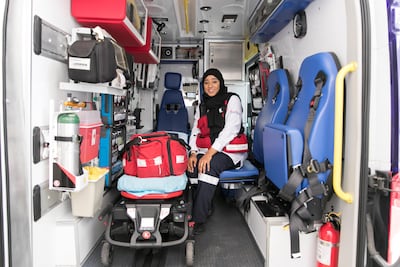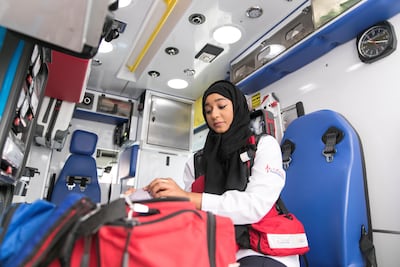More than a year after Shamsa Safar saved a man suffering from a heart attack, she still makes time to visit him in hospital. Her job as an emergency responder ended that day but her sense of duty endured beyond what was expected of her to what she expected from herself.
But Ms Safar is not your average paramedic. A young Emirati woman in a male-dominated field, she says her job requires her to be both mentally and physically strong.
In the past year alone she has rushed to hundreds of incidents to help rescue people in danger. Ms Safar has to make life-changing decisions as soon as she arrives at a scene. From critical medical emergencies to major road accidents she cannot afford to second guess herself.
“Every second matters while performing my job,” says Ms Safar. “Being the first emergency medical responder who arrives at the scene, I work against the clock.”
Ms Safar, earned a bachelor of science degree in emergency medical services at the Higher Colleges of Technology, and trained at Dubai Corporation for Ambulance Services for three years before joining as a full-time paramedic a year ago.
“I always wanted to be a paramedic. I want to save people’s lives. Our job is completely different from working in any other job. Being a paramedic means that every second matters and every action taken to save a person’s life,” she says.
The 24-year-old emergency medical responder sees her high-stress job as caring for all lives, no matter the age.
“We deal with highly-stressful events every day, but I will never forget the day I helped a woman struggling with giving birth. This incident took place around seven months ago and I felt that our job is not only do to deal with people who lose their lives, but also we help in the birth of a new life.”
Despite emergency response being an essential aspect of paramedicine, she says her job requires skills that extend far beyond responding to emergencies.
The elderly Emirati man Ms Safar visits to this day is a testament her dedication.
“He suffers from several illnesses, including diabetes and heart related diseases. I felt that he was neglected by his family members because his health condition keeps getting worse. I visited him this Tuesday at his home. He was not eating well.”
Ms Safar said that in many cases, a medical emergency responder has to connect with the patient both psychologically and socially. “I spoke to the Emirati patient and asked him why he is not eating well or accepting to eat any food. I tried to connect with him to convince him to eat.”
Saving people is what she signed up for but the nature of her job also involves a lot of loss.
When she was called to help an Emirati woman suffering from a cardiac arrest and the woman died despite her best efforts, she was unable to sleep for days afterwards.
Being too emotional is both Ms Safar’s strength and weakness but she says cases involving children are the most difficult. “It is very painful to see a kid suffering from an injury. There are specific methods to deal with children and not to make them uncomfortable or frightened because of the way we are dressed.”
She says accidents that may have been avoided are also difficult to bear witness to.
“Once I received a report about someone who might dead in a home, where the family of this home where outside the country. I entered the home to find out what’s the cause of the smell and I found that the maid was dead due to her mobile exploded underneath her head. She was charging her phone and put it under her pillow.
“Other incidents when motorists die in traffic crashes due to overspeeding or not wearing a helmet while riding a bike. I feel that the causes of their deaths could have been prevented if they were a bit more careful.”
Her colleagues are a strong source of support in such cases.
"The best people to speak to about our work experiences are our colleagues because we both go through similar experiences and will understand how I feel about it."
Ms Safar believes it is important to teach people how to react in case of emergency.
“I have experienced situations when people were intervening in my job, criticising what I do or even try to move the patient. I stepped up in such situations and requested people around me to not to intervene or they can leave until we finish our job. They should be more aware about the importance of time when patients are suffering from critical condition and action performed on the patient. For instance, moving a motorist who experienced a car accident might affect their spinal cord.”
The advice she gives to anyone aiming to become an emergency responder is to earn a bachelor’s degree as she did and get lots of practice, act with courage, decisiveness and resolve. And Ms Safar seems to have plenty.



